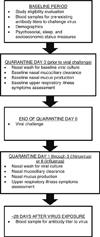Sleep Habits and Susceptibility to Upper Respiratory Illness: the Moderating Role of Subjective Socioeconomic Status
- PMID: 27679462
- PMCID: PMC5253106
- DOI: 10.1007/s12160-016-9835-3
Sleep Habits and Susceptibility to Upper Respiratory Illness: the Moderating Role of Subjective Socioeconomic Status
Abstract
Background: Sleep is a predictor of infectious illness that may depend on one's socioeconomic status (SES).
Purpose: This study aimed to investigate the moderating effects of objective and subjective SES on sleep-clinical cold risk link and test whether nasal inflammation serves as a plausible biological pathway.
Methods: This study combined data (n = 732) from three viral challenge studies. Measures of self-reported sleep and objective and subjective measures of SES were obtained. Participants were quarantined and administrated rhinovirus (RV) or influenza virus and monitored over 5 (RV) or 6 (influenza) days for the development of a cold. Symptom severity, including mucus production and nasal clearance time, and levels of nasal cytokines (interleukin (IL)-6 and IL-1β) were measured prior to administration and each day during the quarantined period.
Results: Subjective SES, but not objective SES, moderated associations between shorter sleep duration and increased likelihood of a clinical cold. Compared to ≥8-hour sleepers, ≤6-hour sleepers with low subjective SES were at increased risk for developing a cold (OR = 2.57, 95% CI 1.10-6.02). There was no association between sleep duration and colds in high subjective SES participants. Among infected individuals who reported low subjective SES, shorter sleep duration was associated with greater mucus production. There was no evidence that markers of nasal inflammation mediated the link between sleep duration and cold susceptibility among those reporting low subjective SES.
Conclusion: Subjective SES may reflect an important social factor for understanding vulnerability to and protection against infectious illness among short sleepers.
Keywords: Cytokines; Sleep; Socioeconomic status; Upper respiratory infection.
Conflict of interest statement
Compliance with Ethical Standards Authors’ Statement of Conflict of Interest and Adherence to Ethical Standards Dr. Prather is currently a paid consultant for Posit Science. He reports no other potential conflicts of interest. Janicki-Deverts, Adler, Hall, Cohen declare that they have no conflict of interest.
Figures



Similar articles
-
Objective and subjective socioeconomic status and susceptibility to the common cold.Health Psychol. 2008 Mar;27(2):268-74. doi: 10.1037/0278-6133.27.2.268. Health Psychol. 2008. PMID: 18377146
-
Childhood socioeconomic status, telomere length, and susceptibility to upper respiratory infection.Brain Behav Immun. 2013 Nov;34:31-8. doi: 10.1016/j.bbi.2013.06.009. Epub 2013 Jul 8. Brain Behav Immun. 2013. PMID: 23845919 Free PMC article.
-
Behaviorally Assessed Sleep and Susceptibility to the Common Cold.Sleep. 2015 Sep 1;38(9):1353-9. doi: 10.5665/sleep.4968. Sleep. 2015. PMID: 26118561 Free PMC article. Clinical Trial.
-
Keynote Presentation at the Eight International Congress of Behavioral Medicine: the Pittsburgh common cold studies: psychosocial predictors of susceptibility to respiratory infectious illness.Int J Behav Med. 2005;12(3):123-31. doi: 10.1207/s15327558ijbm1203_1. Int J Behav Med. 2005. PMID: 16083315 Free PMC article. Review.
-
Socioeconomic status and sleep health: a narrative synthesis of 3 decades of empirical research.J Clin Sleep Med. 2023 Mar 1;19(3):605-620. doi: 10.5664/jcsm.10336. J Clin Sleep Med. 2023. PMID: 36239056 Free PMC article. Review.
Cited by
-
Potential of biomarkers of ageing in predicting severity of influenza virus infection and vaccination efficacy.NPJ Aging. 2025 Jul 1;11(1):56. doi: 10.1038/s41514-025-00212-5. NPJ Aging. 2025. PMID: 40595702 Free PMC article. Review.
-
Social patterning of acute respiratory illnesses in the Household Influenza Vaccine Evaluation (HIVE) Study 2014-2015.Epidemiol Infect. 2019 Jan;147:e185. doi: 10.1017/S0950268819000748. Epidemiol Infect. 2019. PMID: 31063118 Free PMC article.
-
The relationship between duration and quality of sleep and upper respiratory tract infections: a systematic review.Fam Pract. 2021 Nov 24;38(6):802-810. doi: 10.1093/fampra/cmab033. Fam Pract. 2021. PMID: 33997896 Free PMC article.
-
Global burden of upper respiratory infections in 204 countries and territories, from 1990 to 2019.EClinicalMedicine. 2021 Jun 28;37:100986. doi: 10.1016/j.eclinm.2021.100986. eCollection 2021 Jul. EClinicalMedicine. 2021. PMID: 34386754 Free PMC article.
-
Altered populations of natural killer cells, cytotoxic T lymphocytes, and regulatory T cells in major depressive disorder: Association with sleep disturbance.Brain Behav Immun. 2017 Nov;66:193-200. doi: 10.1016/j.bbi.2017.06.011. Epub 2017 Jun 20. Brain Behav Immun. 2017. PMID: 28645775 Free PMC article.
References
-
- Cappuccio FP, Cooper D, D'Elia L, Strazzullo P, Miller MA. Sleep duration predicts cardiovascular outcomes: A systematic review and meta-analysis of prospective studies. Eur Heart J. 2011;32:1484–1492. - PubMed
MeSH terms
Grants and funding
LinkOut - more resources
Full Text Sources
Other Literature Sources

